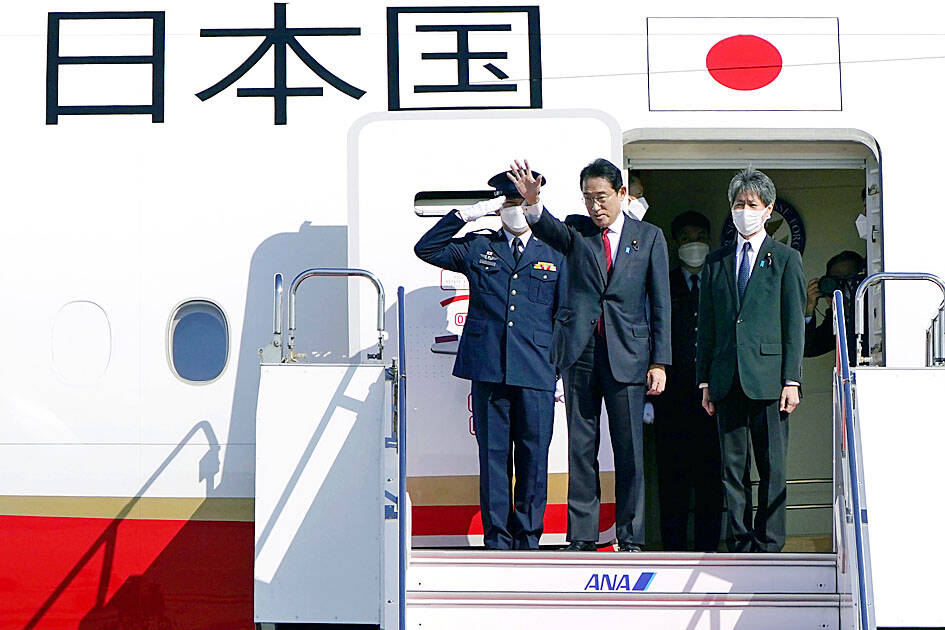Japanese Prime Minister Fumio Kishida, who is traveling to Australia to meet with Australian Prime Minister Anthony Albanese, yesterday said he wants to bolster military and energy cooperation between the two countries amid their shared concerns about China.
Kishida said he hopes to update their 2007 bilateral security pact to factor in the progress they have made and further promote their partnership.
Australia’s liquefied natural gas (LNG) and coal exports are key to a stable energy supply for resource-scarce Japan, and Kishida said he hopes to discuss the future of Japanese resources and energy stability with Albanese.

Photo: AP
“For Japan, Australia is an important country that we share universal values with, such as freedom and democracy, as well as strategic benefits, and it is an important country from the resource and energy point of view,” Kishida said before boarding a flight to Perth.
He added that Australia is a key member of the Quadrilateral Security Dialogue, which also includes the US and India, and was established to discuss regional security and economic issues as a counter to China’s growing influence.
Japan and Australia, both US allies, share a similar vision for regional security, and Japan hopes to elevate its cooperation with Australia. The leaders are hoping to issue a new declaration on security cooperation that would reinforce the 2007 pact looking ahead to the next decade, a Japanese Ministry of Foreign Affairs official said on condition of anonymity, citing protocol.
The pact commits the countries to regional and global peace and stability, as well as cooperation on counterterrorism and rebuilding Iraq after the 2003 war.
Kishida and Albanese are also to consider further implementing the Reciprocal Access Agreement, a security pact Kishida struck in January with then-Australian prime minister Scott Morrison, which removes obstacles to holding joint military exercises in either country, the official said.
Amid China’s growing assertiveness in the region, Japan has been expanding its security cooperation in recent years beyond its only military ally, the US, and has forged close ties especially with Australia. Tokyo also has developed defense ties with other countries in the Asia-Pacific region and Europe.
Kishida is scheduled to hold talks with Albanese today before he meets with Japanese and Australian business representatives, visits a facility related to green energy and meets with Japanese residents before heading back to Japan later today, the Japanese official said.
The leaders are to discuss cooperation in LNG and other energy sources such as ammonia and hydrogen, the person said, adding that Kishida’s meeting in Perth, the capital of Western Australia, is significant, as the state exports most of Japan’s LNG.
Japan depends on Australia for nearly 40 percent of its LNG, and is seeking a stable energy supply amid global disruption.

PLA MANEUVERS: Although Beijing has yet to formally announce military drills, its coast guard vessels have been spotted near and around Taiwan since Friday The Taiwanese military is on high alert and is closely monitoring the Chinese People’s Liberation Army’s (PLA) air and naval deployments after Beijing yesterday reserved seven airspace areas east of its Zhejiang and Fujian provinces through Wednesday. Beijing’s action was perceived as a precursor to a potential third “Joint Sword” military exercise, which national security experts said the PLA could launch following President William Lai’s (賴清德) state visits to the nation’s three Pacific allies and stopovers in Hawaii and Guam last week. Unlike the Joint Sword military exercises in May and October, when Beijing provided detailed information about the affected areas, it

CHINA: The activities come amid speculation that Beijing might launch military exercises in response to Lai’s recent visit to Pacific allies The Ministry of National Defense (MND) yesterday said China had nearly doubled the number of its warships operating around the nation in the previous 24 hours, ahead of what security sources expect would be a new round of war games. China’s military activities come amid speculation Beijing might organize military drills around the nation in response to President William Lai’s (賴清德) recent visit to Pacific allies, including stops in Hawaii and Guam, a US territory. Lai returned from the week-long trip on Friday night. Beijing has held two rounds of war games around Taiwan this year, and sends ships and military planes

Five flights have been arranged to help nearly 2,000 Taiwanese tourists return home from Okinawa after being stranded due to cruise ship maintenance issues, the Ministry of Transportation and Communications announced yesterday. China Airlines Ltd (中華航空), and EVA Airways Corp (長榮航空) have arranged five flights with a total of 748 additional seats to transport 1,857 passengers from the MSC Bellissima back to Taiwan, the ministry said. The flights have been scheduled for yesterday and today by the Civil Aviation Administration, with the cruise operator covering all associated costs. The MSC Bellissima, carrying 4,341 passengers, departed from Keelung on Wednesday last week for Okinawa,

China is deploying its largest navy fleet in regional waters in nearly three decades, posing a threat to Taiwan that is more pronounced than previous Chinese war games, the Ministry of National Defense said today. Speaking in Taipei, ministry spokesperson Sun Li-fang (孫立方) said the scale of the current Chinese naval deployment in an area running from the southern Japanese islands down into the South China Sea was the largest since China held war games around Taiwan ahead of 1996 Taiwanese presidential elections. China's military has yet to comment and has not confirmed it is carrying out any exercises. "The current scale is